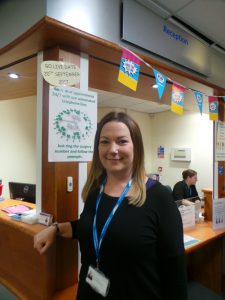
Emma Hewitt, Senior Clinical Pharmacist
Patients in Hull, Harrogate and North Lincolnshire are among 34 million nationally set to benefit from improved GP services as NHS England boosts the number of surgery-based clinical pharmacists.
NHS England has announced today that 168 more pharmacists nationally will be in post by March 2018.
Leeds Road Surgery in Harrogate will have one full time and one part time clinical pharmacist, the Modality Group in Hull will have two and the East Care Network in North Lincolnshire will have one.
Andrew King, Managing Partner at Leeds Road Practice in Harrogate, said: “Clinical pharmacists take a substantial amount of work from the GPs in the practice which is invaluable for the service we provide.
“They work on hospital discharge, liaising with nursing homes as well as working face to face with patients, for example, when there is demand for urgent prescriptions – all of this would usually fall to the GP.”
The clinical pharmacists will also benefit patients from three other practices in Harrogate including Moss and Partners, Kings Wood and Church Avenue.
Five GP practices under the Modality Partnership are to benefit from two clinical pharmacists who will work in Diadem Medical Practice, Faith House Surgery, New Hall Surgery, Newland Group Medical Practice and Springhead Medical Centre.
General Manager for the Modality Partnership, Hull Division, Rob Thompson, said: “We have come together as five practices to develop primary care at scale and as part of that we are looking at our workforce and how we can best use our staff to meet the needs of our patients.
“Clinical pharmacists are able to reduce the burden on GPs by carrying out task such as managing prescription queries from patients and community pharmacy. They also help reduce the administration burden on GP’s by dealing with discharge summaries from hospitals. This frees up their time to ensure that patients who really need to see a GP can do so”
Geoff Day, Head of Primary Care Commissioning at NHS England (North Yorkshire and the Humber) said: “We are delighted to be announcing these pharmacists will now be working within GP surgeries.
“We see this as an important project and it is part of a number of initiatives we are supporting to build capacity and resilience into primary care.
“Clinical pharmacists have a wealth of knowledge and skills to offer great patient care, in a more convenient way and also taking some of the pressure off GPs, particularly at this time of year when we know demand is even greater than usual.”
Clinical pharmacists work as part of the general practice team using their expert knowledge of medicines to assess and treat patients. Some are also able to prescribe and more are being trained.
This includes help to manage care for people with long-term conditions, such as high blood pressure, earlier and more effectively to prevent diseases such as cardiovascular disease; advice on medicines and providing NHS health checks.
Their input delivers quicker access to clinical advice for patients and frees GPs to spend more time treating patients with more complex needs.
Dr Arvind Madan, GP and NHS England Director of Primary Care, said: “The clinical pharmacist programme has proven to be a hugely popular with practices and patients and pharmacists themselves.”
Clinical pharmacists also undertake medicines reviews to proactively manage people who are taking multiple medicines, especially older people and those in residential care homes. They also provide leadership on improving outcomes and value from medicines, including ensuring prescribers in the practice conserve antibiotics in line with local antimicrobial stewardship guidance.
It is part of a wider approach to improving outcomes and value from medicines across the NHS, making sure prescribers and patients can have confidence that they are consistently using medicines in a way that gives the best possible health outcomes.
NHS England is now encouraging applications to the next wave of the scheme from across the country by 19 January 2018.
The increase in pharmacists in general practice is part of a wider expansion of the general practice workforce so patients have better access to a range of highly trained health professionals.
NHS England, Health Education England, the Royal College of General Practitioners and the British Medical Association’s GP Committee are working with the Royal Pharmaceutical Society to support the programme roll out.

